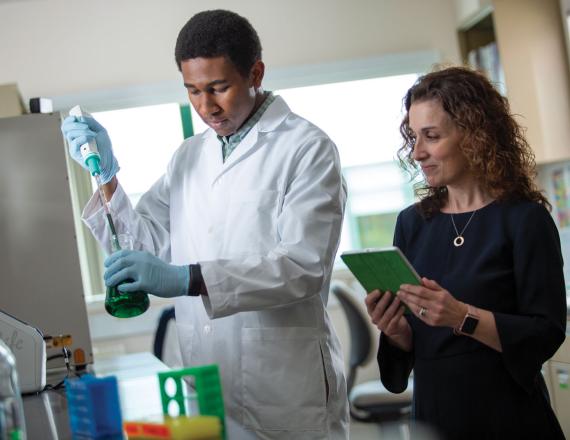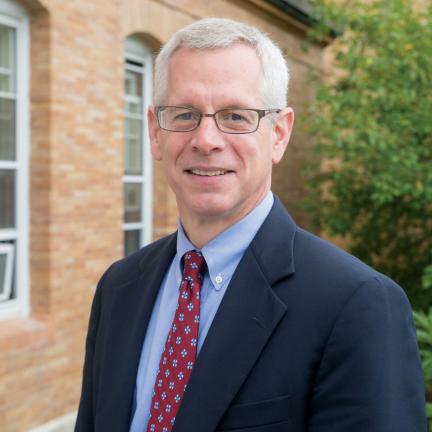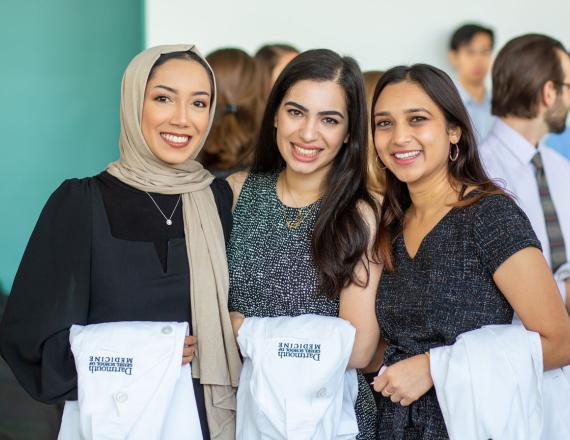The mission of the Geisel School of Medicine at Dartmouth is to create a healthier, more equitable world.

Geisel stats
7,300+
applicants each year for the 92 spots in Geisel’s MD program
400
MD students and 120 students pursuing public health degrees
11
nationally designated centers of research excellence in various disciplines
Bridging academia and health care
As one of the nation's oldest and most preeminent medical schools, the Geisel School of Medicine at Dartmouth sits at the nexus between a premier liberal arts college and an exceptional academic health system. Our dynamic environment fosters collaboration between faculty, staff, and students from diverse disciplines across Dartmouth College, while our strategic partnership with Dartmouth Health enhances our ability to deliver cutting-edge medical education, research, and patient care. This synergy between academia and healthcare creates a powerful ecosystem for innovation, allowing us to advance medical knowledge, improve health outcomes, and train the next generation of healthcare leaders.
Advancing healthcare through education and research
Building on the success of Dartmouth's completed Call to Lead campaign, Geisel continues to attract visionary donors to help advance the following priorities:
- Educating Complete Physicians and Health Sciences Professionals
- Strengthening Health Care Systems
- Innovating to Overcome Cancer
- Building the Foundation for Children’s Health
These priorities reflect our commitment to comprehensive medical education, including our expanding Health Sciences programs, and our dedication to impactful research and healthcare improvement.
Would you like to speak with us about giving to Geisel?
Contact Elizabeth Dollhopf-Brown at Elizabeth.E.Dollhopf-Brown@dartmouth.edu or 603-646-5792.
Duane's testimonial
We seek to create citizens of curiosity, physicians and scientists who will ask the tough questions, who will listen carefully to patients, and who will examine and improve healthcare systems”

Join the Health Leaders Circle
Annual funds provide flexible and essential support for the Geisel School of Medicine and its academic medical partners, including Dartmouth Health, Dartmouth Health Children's, and Dartmouth Cancer Center. We welcome donors making gifts of $5,000 or more to one of the annual funds into the Health Leaders Circle.

Five ways that Geisel is improving lives
- Birthplace of modern immunotherapy
-
The first, life-saving immunotherapy drugs for cancer (Opdivo and Yervoy) were based on discoveries made by Dartmouth scientists who founded the company Medarex. Today, Dartmouth researchers are leading the way again, with next-generation immunotherapies, three of which are in multi-national clinical trials. This includes the world’s first universal, off-the-shelf, CAR T-cell therapy that can target more than 80% of human cancers.
- Healthcare delivery science: more does not equal better
-
Dartmouth physician Jack Wennberg, MD, was the first to document widespread and unwarranted geographic variations in healthcare costs and outcomes—variations as much as 10-fold without any benefits to patients. Wennberg and colleagues created the now legendary Dartmouth Atlas of Healthcare and The Dartmouth Institute for Health Policy & Clinical Practice (TDI). Today, The Dartmouth Institute is pioneering new ways of delivering health care and designing health care systems to improve quality, lower costs, empower patients, and improve health equity.
- Cross-training medical students in health systems
-
Geisel pioneered the integration of health care delivery science into the MD curriculum. In fact, it was the first medical school to require a hands-on clinical quality improvement clerkship for all medical students, beginning in 2010. Today, Geisel is continuing its national leadership in medical education as one of seven medical schools selected for the Kern National Network for Caring and Character in Medicine, which aims to transform medical education. In 2019, Geisel launched a new coaching program for students, which provides longitudinal advising and professional development.
- Protecting children and babies from toxins
-
Discoveries by Dartmouth researchers have led to new federal guidelines for allowable arsenic levels in baby rice cereal—and prompted the American Academy of Pediatrics to change their infant first-food recommendations. The researchers found that exposure to arsenic through rice products, apple juice, and contaminated water negatively impacts fetal growth, immune system function, and gene expression. Now, because of the expertise of researchers at Geisel and in the Department of Earth Sciences, Dartmouth is leading a five-year, multi-million-dollar study in collaboration with Stanford University and Harvard Medical School, investigating the relationships between lifestyle, medical interventions, environmental exposures, epigenetics, growth, immune function, and neurodevelopment.
- Training Rwanda’s healthcare workforce
-
Through its Center for Global Health Equity, Geisel is one of several top U.S. medical schools and hospitals chosen by the Rwandan Health Ministry to help rebuild the nation’s health care workforce. Beginning in 2012, nearly a dozen Geisel faculty—general practitioners, specialists, and subspecialists—have worked in Rwanda for months at a time to train the country’s physicians and medical educators. Rwandan physicians and trainees have also spent time at Dartmouth and Dartmouth-Hitchcock Medical Center—as part of fulfilling Dartmouth’s commitment to reciprocity in global health partnerships.